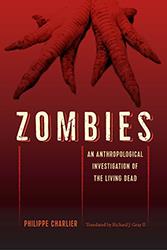Abnormal burial practices have long been a source of fascination and debate within the fields of mortuary archaeology and bioarchaeology. <em>The Odd, the Unusual, and the Strange </em>investigates an unparalleled geographic and temporal range of burials that differ from the usual customs of their broader societies, emphasizing the importance of a holistic, context-driven approach to these intriguing cases.
Search Results for 'Barbara A. Purdy'
1084 results for 'Barbara A. Purdy'
Please note that while you may order forthcoming books at any time, they will not be available for shipment until shortly before publication date
<p><em>Zombies</em> follows Charlier’s journey to understand the fascinating and frightening world of Haiti’s living dead, inviting readers to believe the unbelievable.</p><p><em> </em></p>
<em>Fort St. Joseph Revealed</em> is the first synthesis of archaeological and documentary data on one of the most important French colonial outposts in the western Great Lakes region. Located in what is now Michigan, Fort St. Joseph was home to a flourishing fur trade society from the 1680s to 1781. The site—lost for centuries—was discovered in 1998 by volume editor Michael Nassaney and his colleagues, who summarize their extensive excavations at the fort and surrounding areas in these essays.
<p>A monumental synthesis of a half century of research, this book investigates three communities from the ancient Nubian civilization of the Nile River Valley. Excavations in this region first inspired the “biocultural approach” to human biology now used by anthropologists worldwide, and <em>Life and Death on the Nile</em> exemplifies the very best of this perspective. It is the life’s work of two highly accomplished anthropologists.</p><p> </p>
An interactive, hands-on introduction to the inhabitants of 16th-century Florida and the methods that archaeologists and historians use to study them. 47 "Detective Directives" invite kids to follow clues & conduct their own investigative activities:
This practical guide provides everything the butterfly gardener or naturalist needs to know about the relationship between caterpillars and the plants that help them turn into butterflies. Covers anatomy, biology, ecology, habitat, behavior, defense, and
Redefining the bases and scope of modern Islamic thought, Moussalli suggests that Islamic fundamentalism might prove to be a liberating theology for the modern Islamic world.
<i>Bioarchaeology and Identity in the Americas</i> represents an important shift in the interpretation of skeletal remains in the Americas.










